Partnering for progress
How alumni, faculty and students are tackling global issues through social innovation
By Matthew Biddle
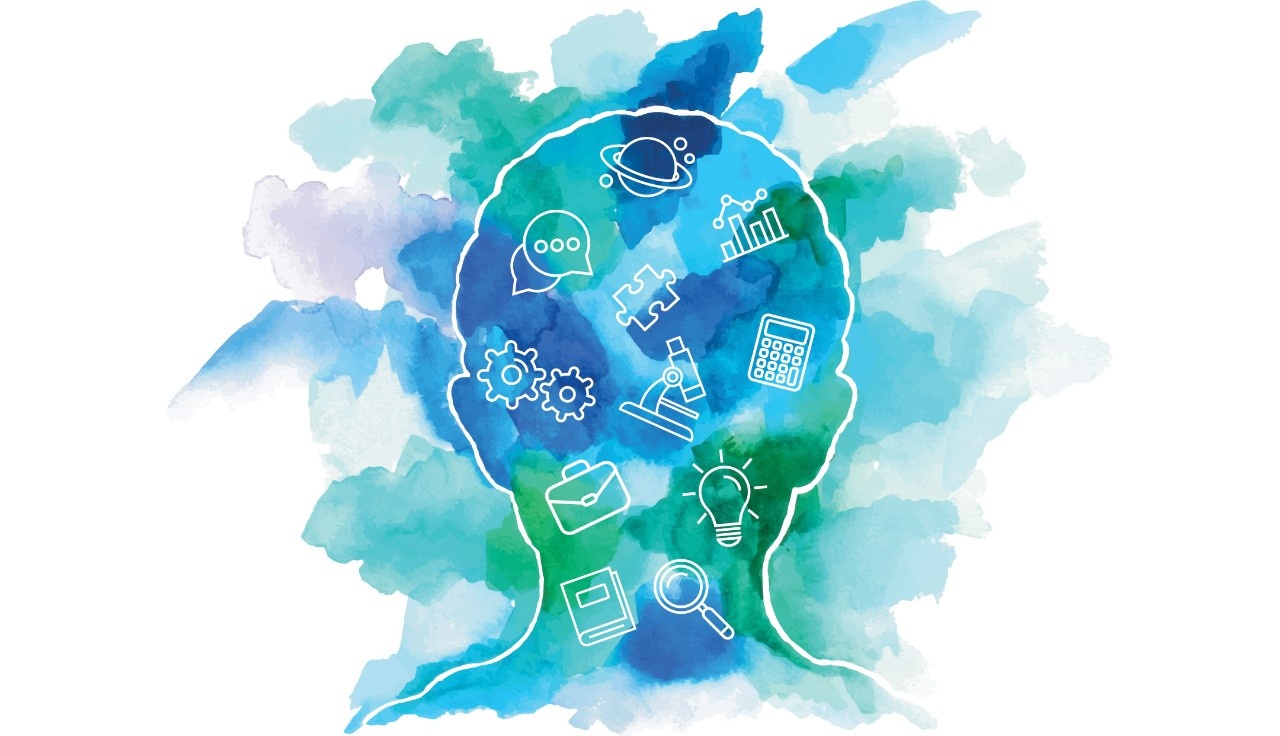
Ten years ago, Plum Organics began with a mission to inspire a lifetime of healthy eating by delivering nutrient-dense food to babies across America.
That mission drives every aspect of operations and culture at the certified B Corp, even when it may not improve profitability. Employees are trained on Plum’s social mission and set metrics as part of their ongoing review, and the company reports annually on its social and environmental impact.
“By working with renowned pediatrician Dr. Alan Greene, we discovered things about the industry we felt were upside down and developed a food philosophy to change them. For example, many of the lowest nutrient foods were the foundation of baby food,” says Tyler Ricks, MBA ’96, former chief marketing officer and sales officer for Plum.
Ricks led marketing during Plum’s conversion to a public benefit corporation and was instrumental in developing The Full Effect, a program that fights food insecurity by partnering with nonprofits to promote nutrition education, deliver organic food and support breastfeeding initiatives and other programs in low-income and rural communities. With commitments from organizations along its supply chain, Plum also debuted a buy-one, give-one line of products called Super Smoothies.
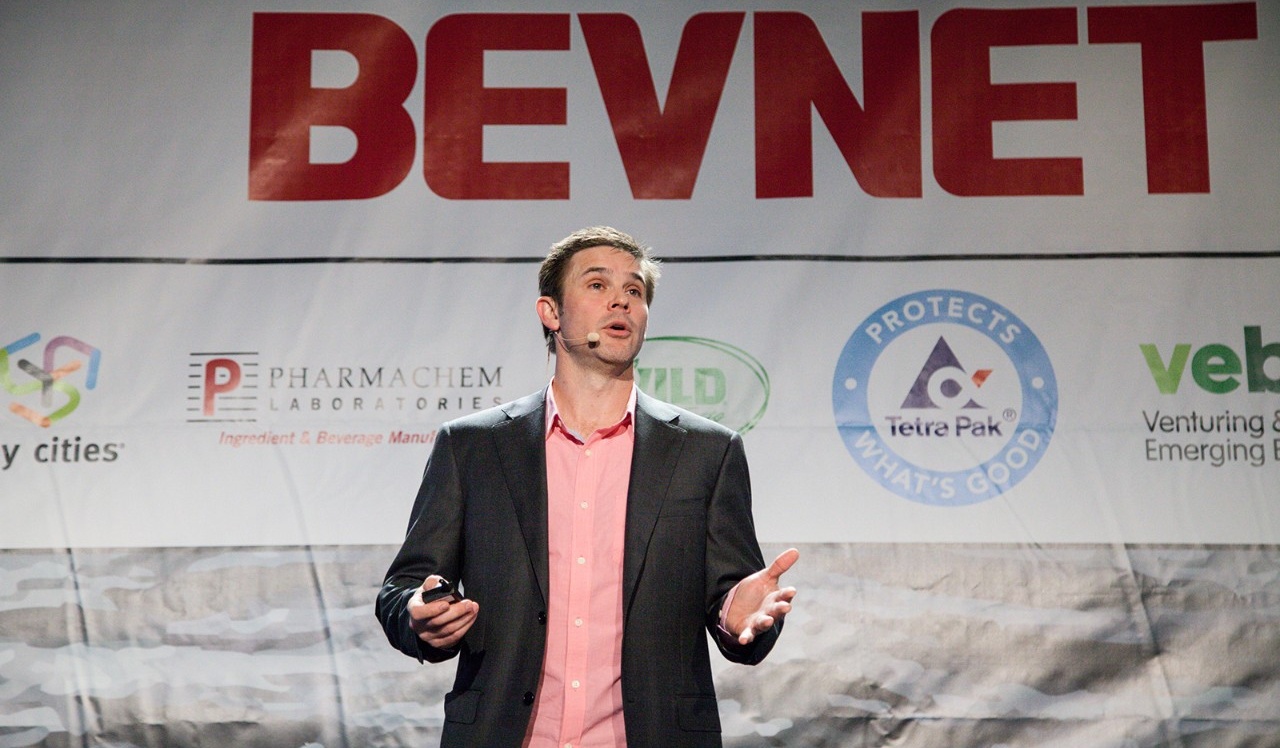
Photo: BevNET
“We went to the homes of low-income consumers who were food insecure, heard about their struggles and, with Dr. Greene’s input, formulated a product to donate that contained nutrients missing from their diets,” says Ricks. “This type of social innovation is absolutely the future of business. In five years, it’s gone from a blip on the radar to being critical for organizations.”
After leaving Plum in 2014, Ricks now serves as president of Noah’s New York Bagels, where his commitment to social causes hasn’t waned. This year, he launched a partnership with LeadersUp, a talent development nonprofit, to hire young people from vulnerable communities for management positions. “We’re hoping to make a difference by providing each individual with an aspirational role, while also recruiting a good fit for our organization,” Ricks says.
Plum and Noah’s are among countless organizations engaged in social innovation by partnering across sectors — and often across borders — to develop novel, economically sustainable solutions to pressing issues facing society. Driven by socially conscious leaders and consumers, as well as the threat of reduced funding for traditional nonprofits, social innovation is rapidly growing worldwide. In the European Union, 10 percent of all businesses are social enterprises. In Senegal, 18 percent of people are pursuing social entrepreneurship, according to a 2016 Global Entrepreneurship Monitor survey. And in the U.S., according to the Social Enterprise Alliance, 60 percent of all social enterprises launched within the last decade.
“Social innovation is driving change across the globe, as companies, nonprofits, governments and individuals work together to find ways to address poverty, health and wellness, climate change, food scarcity and other critical issues we face,” says Paul Tesluk, dean of the School of Management. “Each stakeholder brings critical resources and experiences to the table, and it’s at this intersection where organizations can provide the most social benefit.”
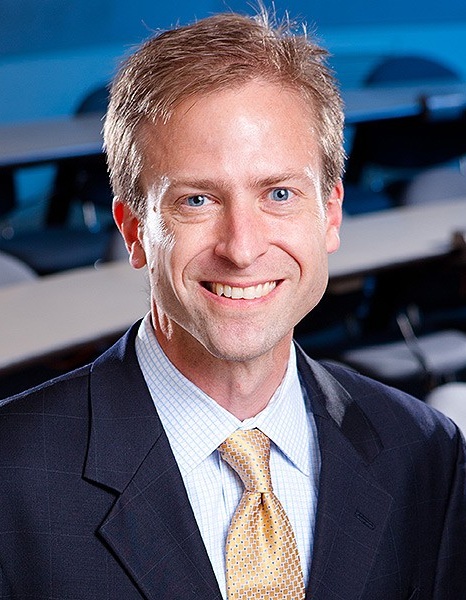
Sustainability in the C-suite
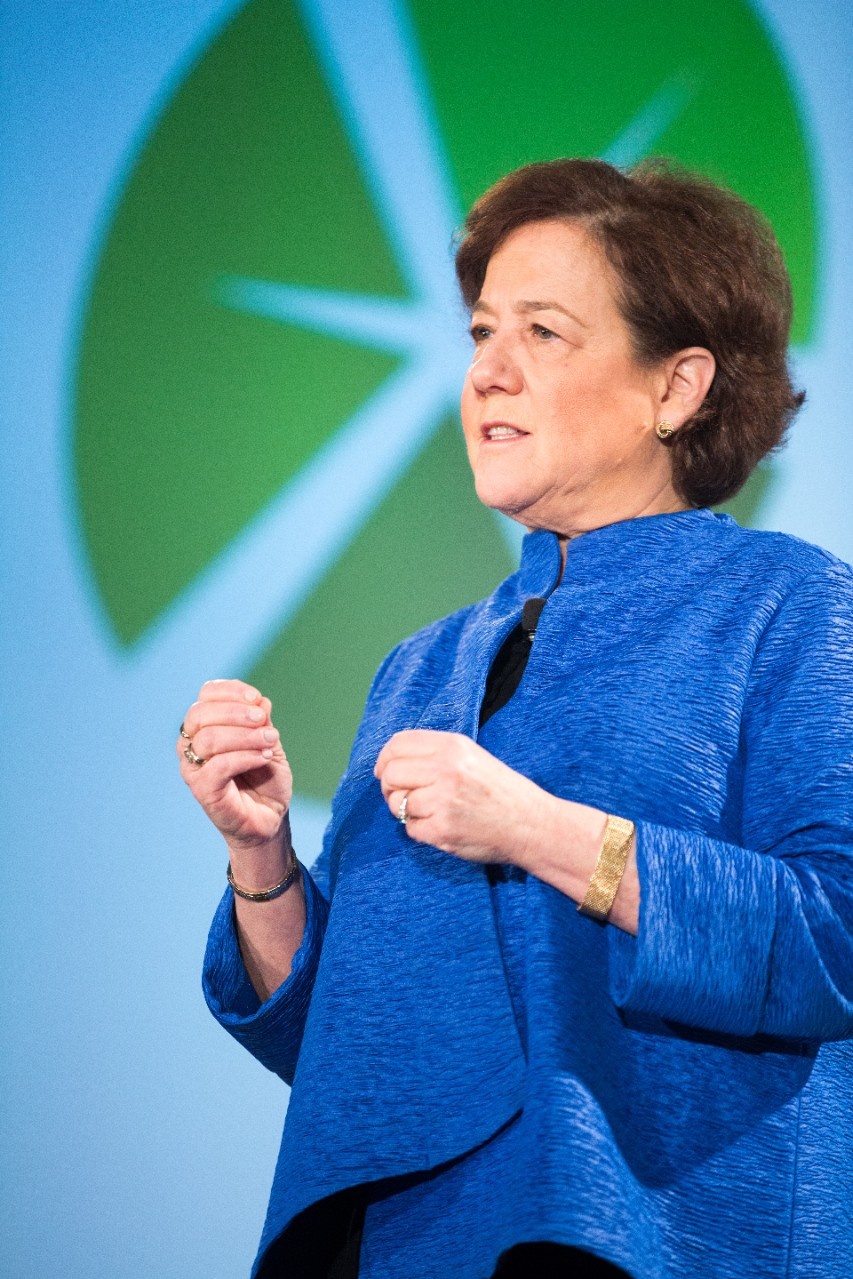
Lubber addresses the 2017 Ceres Conference in San Francisco.
Some of the social innovation trend can be attributed to consumers, who increasingly demand it. A 2015 Mintel study found more than half of consumers have stopped purchasing from brands they deem unethical. Meanwhile, 81 percent of millennials expect companies to publicly commit to good corporate citizenship, according to a Horizon Media study.
But more than addressing consumer tastes, social innovation is often a strong business decision — an opportunity to reduce long-term costs, spur job creation and economic growth, differentiate their brand and protect their supply chain.
Aditya Vedantam, assistant professor of operations management and strategy, researches the environmental impact of business operations and sees more companies mapping their entire supply chain to trace the exact source of their products and ensure their suppliers adhere to a strict code of conduct.
“Sustainability is how you ensure the long-term supply of your key resources,” he says. “By outsourcing, companies increase the risk that factories will be improperly managed or use child labor or that farms will use harmful practices that threaten their supply of high-quality crops. It’s become incredibly important for firms to audit their suppliers, ensure visibility along the supply chain and incentivize their suppliers to use sustainable practices.”
For an increasing number of corporations, climate change has become a critical issue, as businesses lead the charge to find innovative, collaborative ways to reduce future climate impacts.
“Sustainability is a capital markets issue — it’s a financial bottom line,” says Mindy S. Lubber, BS ’75, MBA ’77, CEO and president of Ceres, a nonprofit that brings companies, investors and advocates together to tackle such challenges as climate change, water scarcity and pollution, and human rights abuses. The organization’s networks include leading Fortune 500 companies and institutional investors with assets totaling $17 trillion.
“Hundreds of companies and investors attended or sent commentary to the United Nations Climate Change Conference in Paris about the imperative of signing an international agreement,” she says. “Climate change has an impact on almost every sector of society, and companies are looking differently at what they do and how they do it and incorporating sustainability into that calculus.”
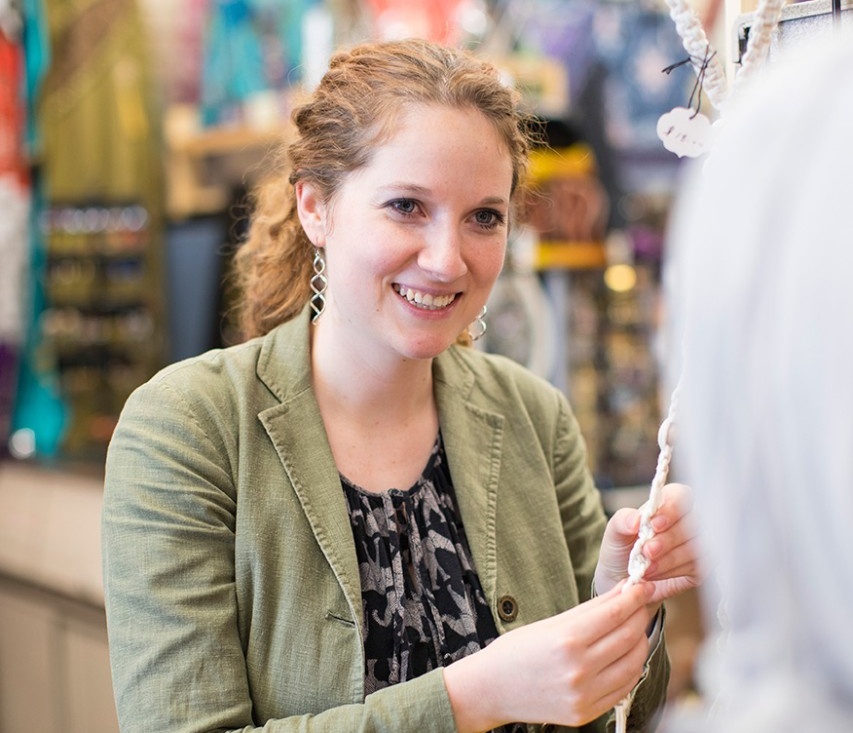
DiFonzo talks with an entrepreneur from Iraq in the West Side Bazaar. Photo: Tom Wolf
Engaging entrepreneurs, uplifting communities
Bryana DiFonzo, PMBA ’16, came to the School of Management to add business skills to her nonprofit background so she could approach social issues from a new perspective. Today, as community development director for the Westminster Economic Development Initiative (WEDI), she supports the organization’s mission to create communities of entrepreneurs and change neighborhoods across Buffalo.
As part of her role, she works with immigrant and refugee business owners in the West Side Bazaar, a small business incubator for retail and food vendors of many nationalities.
“WEDI provides microloans, space and financial education so entrepreneurs can lift themselves out of poverty, hire others and transform communities,” she says. “We’ve been successful because we understand the business side and the systems we must address, as well as the social side, including how to help refugees with trauma, work with interpreters and overcome barriers.”
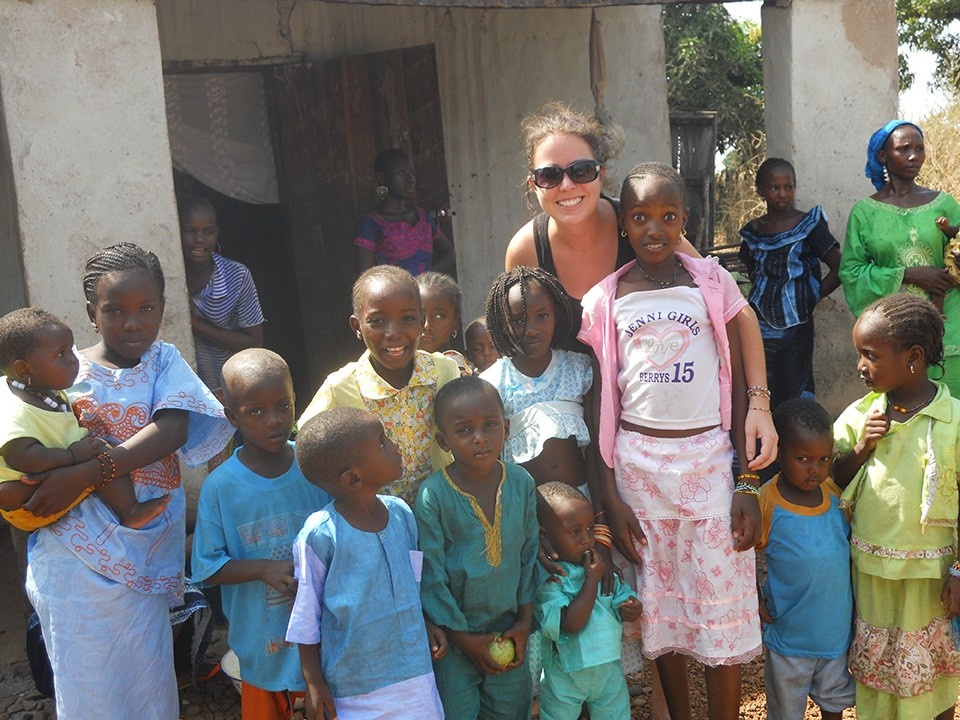
Piotrowski in Senegal with the Peace Corps.
Alexandra Piotrowski, BS ’05, has seen firsthand the devastating consequences of businesses that ignore their community impact. As a small enterprise development agent with the Peace Corps in Senegal, she worked in villages where gold mining companies had taken farmland, exploited workers and spread toxic chemicals.
“That experience prompted me to shift my career to corporate social responsibility because I truly believe businesses, even multibillion-dollar companies, can help developing countries — and it can be mutually beneficial,” she says. “By working with the local population and other organizations, businesses can find the natural and human resources they need, but do so in a responsible way by thinking outside the box.”
Piotrowski now serves as an economic development specialist at the U.S. Small Business Administration, conducting workshops and training for entrepreneurs and connecting business owners in Maryland, Virginia and Washington, D.C., to opportunities like InnovateHER, a competition for women entrepreneurs, and Operation Hope, a nonprofit dedicated to financial literacy empowerment and education.
“The intersection of businesses, nonprofits and governments is a powerful place to address social issues,” says DiFonzo. “No organization or sector has a corner on helping people or changing social systems. Through meaningful collaboration, we can brainstorm solutions and create more impact than any organization can individually.”
Patients — not profits
It’s through collaboration that global health organizations are able to research, develop and introduce life-saving medicine. As an executive at Merck & Co. for more than a decade, Margaret McGlynn, MBA ’83, secured approval to provide vaccines at cost in developing countries, led a campaign aimed at protecting women from cervical cancer and opened a vaccine research center in India — all made possible through public-private partnerships.
For example, when Merck set out to introduce a rotavirus vaccine, McGlynn faced steep barriers to eliminate the traditional 15-year lag from when a vaccine was offered in wealthy countries versus developing countries. To overcome this challenge, Merck partnered with global nonprofit PATH to conduct clinical trials in Africa and Asia, worked with the Nicaraguan government to vaccinate every baby born over a three-year period and, after demonstrating successful results in Nicaragua, coordinated with Gavi and other organizations to introduce the vaccine in other developing countries.
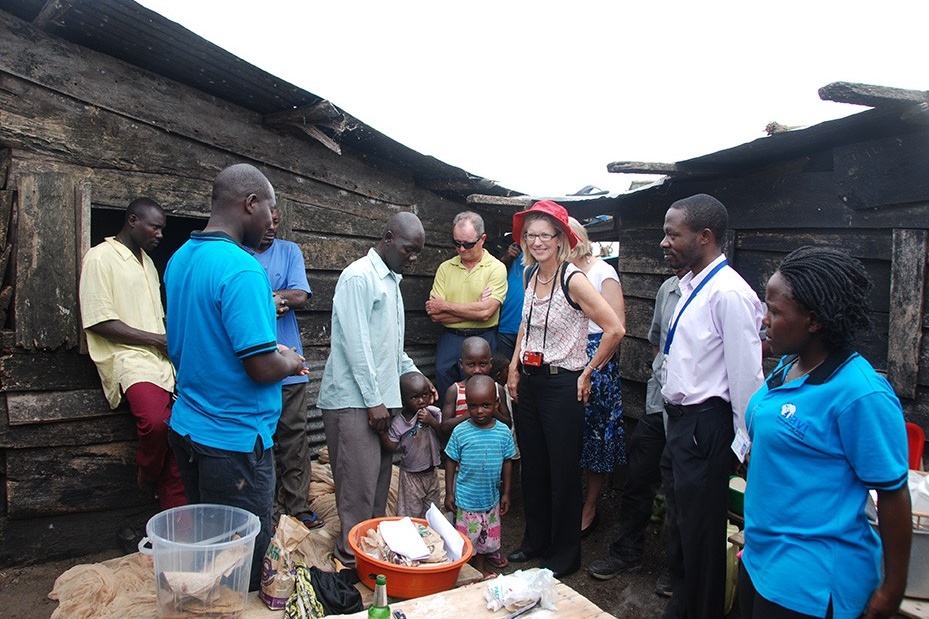
McGlynn with community members in Africa. Photo: IAVI
After leaving Merck in 2011, McGlynn was named CEO of the International AIDS Vaccine Initiative (IAVI). Again, she relied on public-private partnerships to advance IAVI’s mission.
“The challenge of developing a vaccine for AIDS is one that can only be met by bringing together the financial, scientific and community-based resources of many stakeholders around the world,” says McGlynn, also the founder of the Hempling Foundation for Homocystinuria Research, which funds researchers who are developing treatments for the rare disorder. “IAVI can’t do it on its own, but it can foster partnerships with leading academic medical centers, pharma and biotech companies, and research centers where solutions can be tested.”

The next generation
Collaboration also is the hallmark of the work being done at UB around social innovation. The School of Management and School of Social Work have launched an initiative together to bring entrepreneurial and socially minded students together with faculty from both schools to learn from one another, broaden their skill sets and perspectives, and help mission-driven organizations.
So far, the partnership has yielded the sold-out Leading Innovation in the Social Sector conference (see "Going for good"), a series of workshops and a co-taught class (see "No boundaries, countless ideas"), and the Social Impact Fellows, an eight-week internship program offered in partnership with the Blackstone LaunchPad at UB (see "A summer of impact").
“I hope our students gain an appreciation for what the other discipline brings — because we need their diverse backgrounds,” says Nancy Smyth, dean of the School of Social Work. “For social innovation to be effective, we must understand complex social systems, form solid relationships, set goals and measure our outcomes, and think entrepreneurially. I hope these opportunities change the way our students see the world and approach the issues we face.”

